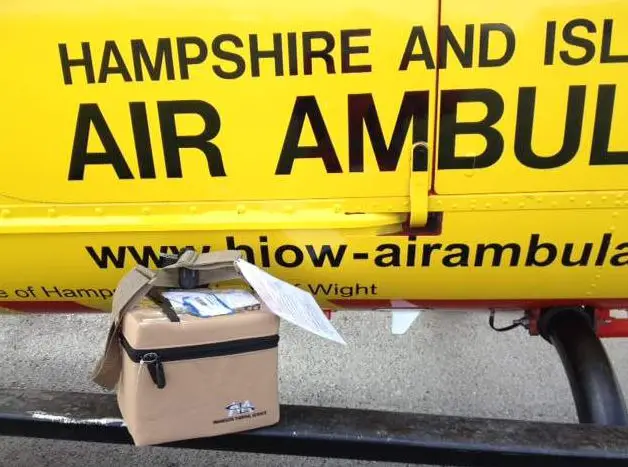This in on behalf of the Air Ambulance. Ed
For patients with serious injuries, the most common causes of death before reaching hospital are problems with getting oxygen into the lungs or significant blood loss.
Using a variety of treatments not usually available until patients reach hospital, the Air Ambulance team are able to optimise oxygenation of the lungs. Until recently, however, they have been unable to replace blood lost from external wounds or internal bleeding before reaching hospital.
The military have, for several years, routinely carried blood on their medical helicopters and have demonstrated the safety and effectiveness of blood transfusions in patients before reaching hospital. A limited number of civilian Air Ambulances in the UK are also now beginning to introduce this therapy, and HIOWAA will begin carrying blood on board all flights from April 2014.
Dr Liz Shrewy, a Major Trauma Anaesthetist at University Hospital Southampton commented,
“HIOWAA carries a highly experienced team of consultant critical care doctors and HEMS paramedics who specialise in the rapid stablisation of patients at the roadside and subsequent transfer to the nearest trauma centre. Having blood on board takes us a step further towards bringing the hospital to the patient in the first crucial minutes after serious injury.”
Using technology first utilised by the British military in Afghanistan, HIOWAA are now able to store blood in the helicopter at precisely the required temperature.
Ambulance will be type O negative blood, known as the ‘universal donor,’ as it is safe to give to any patient. It will be packed within a purpose designed cool box and electronically scanned to record patient details. The scanner will print a unique patient wrist band to ensure that the hospital team know that blood has been given, as well as the tracking details for the blood units. This data is wirelessly transmitted within the hospital onto the transfusion laboratory database.
Doctor David Sutton, recently appointed to the newly created role of Clinical Governance Lead for HIOWWA, commented,
“This important step forward for HIOWAA could not have happened without the dedicated support of the University Hospital Southampton Blood Transfusion Department (UHS BTD), the The Solent Advanced Motorcyclists and of course, members of the public who make regular blood donations.”
UHS BTD have been committed to this exciting development from the start and have agreed to supply blood to HIOWAA three times per week. This involves strict checks of the blood to ensure it is compatible and quality control testing of the equipment to ensure that the blood remains safe whilst waiting the call to attend a patient. Any blood that is not used within 48 hours is returned to UHS BTD where it can re-enter their supply chain and therefore avoid any wastage of this precious resource.
Solent Advanced Motorcyclists have agreed to transfer blood from University Hospital Southampton to HIOWAA at their Air Base in Thruxton every 48 hours as a free service to the charity. Dr Liz Shrewy commented ‘We are extremely grateful to Solent Advanced Motorcyclists for giving up their time to help make this new development possible and for their commitment to helping save patient lives.’
The Hampshire and Isle of Wight Air Ambulance helicopter can be called out many times per day, and these missions are often life saving. From receiving a call, the helicopter can be airborne within four minutes and can reach anywhere in Hampshire within 15 minutes and the Isle of Wight within 20.
The charity receives no government, statutory or national lottery funding for operational purposes, and the charity is entirely dependent on gifts received from members of the public, companies and grant-making bodies to fund their work.




